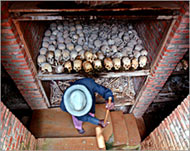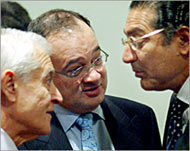Core group to discuss key UN charter
Less than three weeks before a UN summit opens, the 191 UN member states have finally agreed to let about 30 nations take the lead in trying to resolve major differences in a document that world leaders can then adopt.

The United States has submitted hundreds of proposed amendments to the 39-page draft currently on the table, and Russia, the Non-Aligned Movement representing 116 mainly developing countries, and dozens of other countries have submitted hundreds more.
General Assembly President Jean Ping said the “core group” representing all regions and groups at the United Nations would start negotiations on Monday and was prepared to work nights to finalise a document by 2 September if possible.
The text would then be submitted to member states on 6 September for approval, and sent for translation into the UN’s six official languages, he said.
“We have to work hard, and we’ll do everything in order to produce an outcome,” Ping said after a closed-door meeting of representatives from all countries.
Crucial issues
The negotiators will be focusing on seven key issues where there are still serious differences:
- Defining and tackling terrorism
- Disarmament and non-proliferation
- A new Human Rights Council to replace the discredited Human Rights Commission
- A new Peace building Commission to help countries emerging from conflict
- Overhauling UN management
- Taking collective action to protect people against genocide
- Actions to fight poverty and promote development.
But any other issue in the document can also be raised, and even though about 30 countries will be leading the negotiations, any other UN member state can step in with proposals during the negotiations, Ping said.
 |
|
Negotiators will look at action to |
He said the key negotiators would include the five permanent Security Council members – the United States, Russia, China, Britain and France – as well as Malaysia, which currently heads the Non-Aligned Movement, Japan, India, Pakistan and representatives from every region.
“I think we’re making progress,” US ambassador John Bolton said. “We’re prepared to be flexible on format and process. We want a strong outcome document.”
Agreement elusive
He called the US agreement with the Non-Aligned Movement – that all governments should be able to contribute and that the entire text should be open – “a good sign”.
“We’re very pleased about this,” Bolton said. “We’re moving ahead.”
While Bolton raised the possibility of the summit adopting just a short declaration, Ping said negotiators would be working on the 39-page draft – and may decide in addition to issue a two or three page declaration.
 |
|
Munir Akram (R) says it will be |
Whether the 191 UN member states will be able to reach agreement on the substantive issues in the document remains to be seen.
Because time is so short, Pakistan’s UN ambassador Munir Akram said it would be difficult to bridge the differences – but possible.
“We have said right from the start that without negotiations, this document is not going anywhere,” he said.
“This is important for our leaders – to have an outcome, to have something that they can adopt when they are coming together on the 60th anniversary [of the United Nations],” Akram said.
“It will be a bad reflection on the United Nations, and all our leaders, if we are not able to agree. So we have all got a stake on reaching agreement at least on the maximum possible number of issues.”
Comprehensive agreement
Britain’s UN ambassador Emyr Jones Parry, whose country holds the European Union presidency, said the EU “wholeheartedly” supported Ping’s proposal for negotiations.
The challenge now, he said, was to turn the draft into a comprehensive agreement.
“Our heads of government want something that tackles tomorrow’s problems, revitalises multilateralism and the United Nations,” Jones Parry said. “That’s what the European Union will press for.”
|
“Our heads of government want something that tackles tomorrow’s problems, revitalises multilateralism and the United Nations” Emyr Jones Parry,Britain’s UN ambassador |
For the Non-Aligned Movement, the top priority is development – and action to meet UN goals that include cutting extreme poverty by half, ensuring universal primary education, and stemming the Aids pandemic, all by 2015.
Bolton explained in a letter to all UN member states on Friday that the proposed US amendments eliminated all references to the Millennium Development Goals in the draft because Washington opposes a goal calling on donor countries to spend 0.7% of GNP on development aid.
He said in the letter that the target was added in a UN report in 2001 on implementing goals adopted at the UN Millennium Summit in 2000, and was never “formally adopted” by member states.
On Thursday, a UN report said the US spent 0.16% of GNP on international assistance in 2004. By contrast, all EU countries have committed to reach the 0.7% target by 2015.